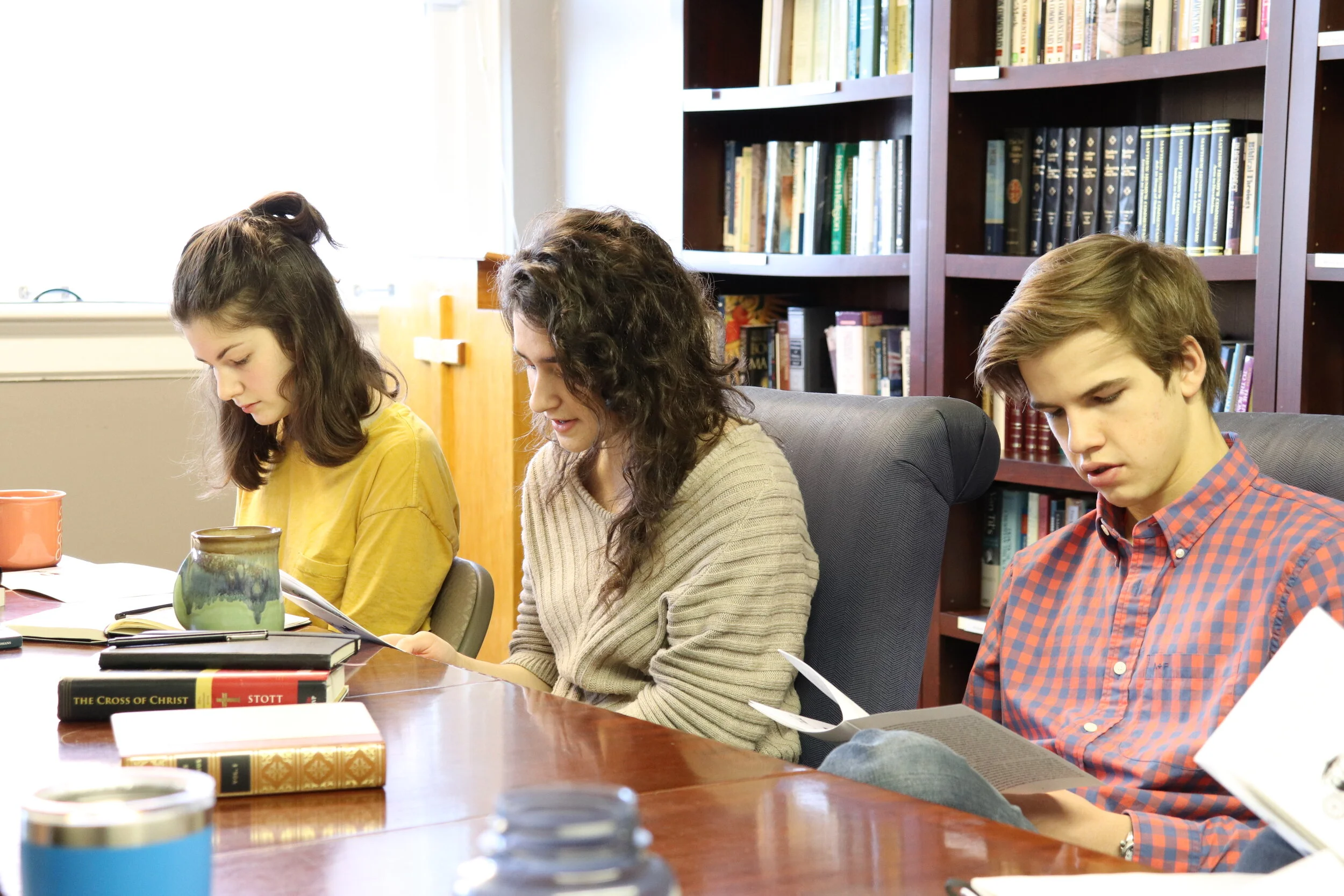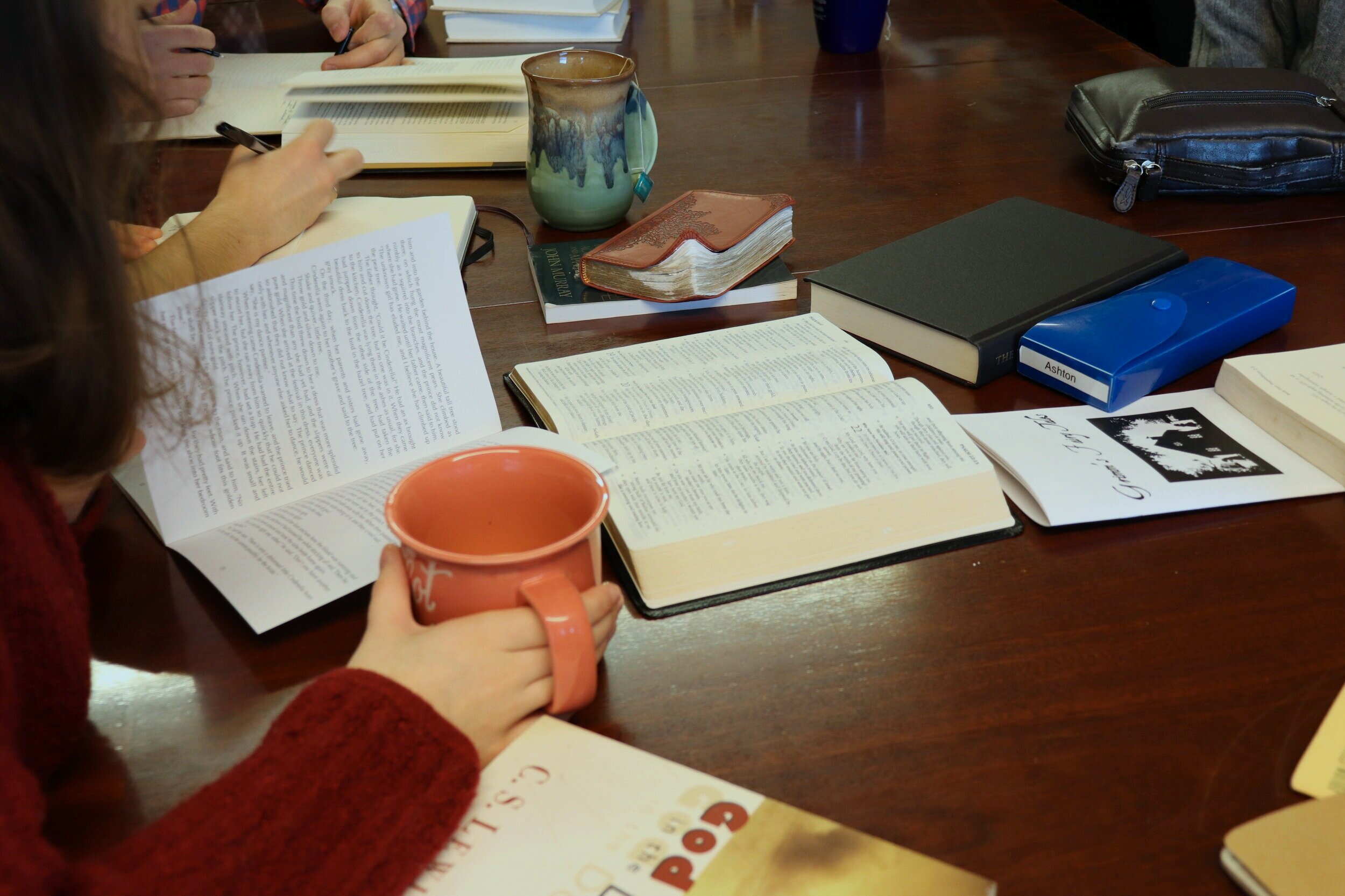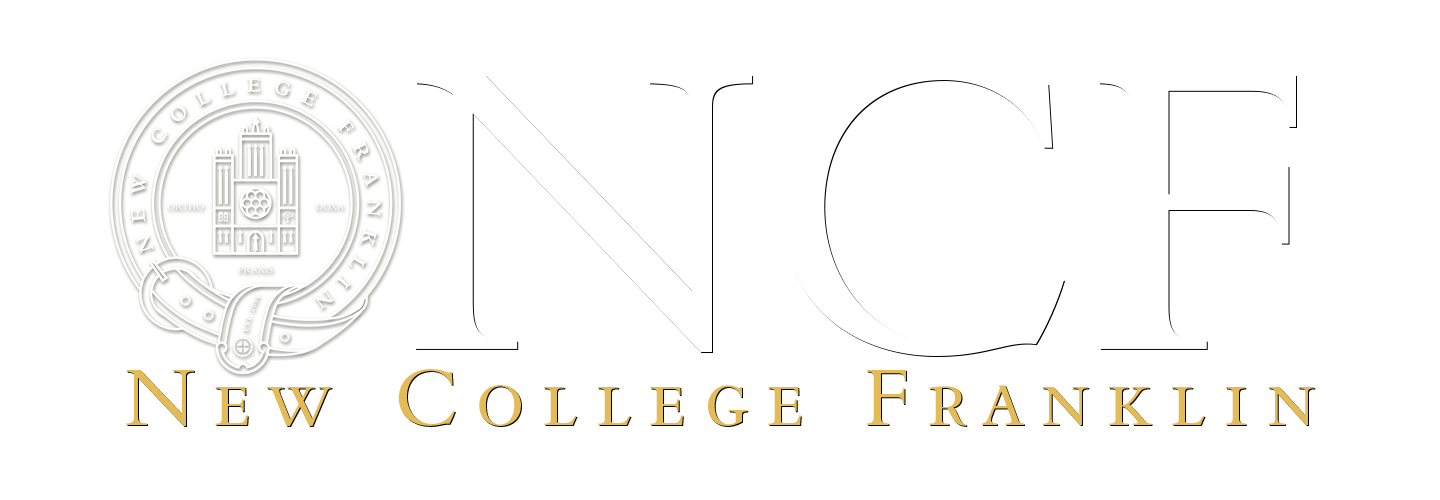
Philosophy of Education
We believe in word-centered education that involves reading and processing ideas verbally for the purpose of integration into life practice.
We read and talk about ideas to gain wisdom for life, but empty philosophy is self-centered and ultimately useless. The Apostle John tells us, “By this we know love, that he laid down his life for us, and we ought to lay down our lives for the brothers” (I John 3:18). We are called to imitate Christ in our deeds, not just our words. The true purpose of reading and talking is to discern what constitutes right action. We read great works of literature, history, and philosophy, and discuss the ideas in these works, evaluating all claims to wisdom and truth with the purifying fire of the Word of God. In this way, our word-centered education is fundamentally the pursuit of wisdom and virtue in the imitation of Christ.
We believe that discussion-based instruction enables professors to carefully guide a student in their thinking and this has greater effect and longevity than lecture-based methodology.
Discussion-based instruction and charitable conversation provides an ideal environment for those more mature in the faith to be guided along the path to knowledge and wisdom. Wisdom is difficult, and only those who desire her will have the necessary persistence and focus to obtain her. The Gospels are filled with the phrases, “Jesus asked his disciples,” “Jesus answered his disciples,” and “Jesus told his disciples.” Jesus’ disciples received the blessing of conversation. Conversation brings the ideas from the page into the mind and heart and transforms information into knowledge. Conversation fosters community and discipleship by tailoring conversation for the specific intellectual and spiritual growth of particular hearts and minds.
True intellectual growth is only possible with corresponding spiritual growth, for wisdom comes from the fear of the Lord and as a gift of grace.
Grace is a key principle that shapes our attitude toward education. Out of His grace, God has blessed us with a holy fear of Him, which is the beginning of wisdom. This understanding fundamentally redefines intellectual pursuits. The writer of Proverbs exhorts us to get wisdom and get understanding (Proverbs 4:7). This means that intellectual growth is an act of obedience, but an act of obedience we are only able to fulfill because we have been given the gift of the fear of the Lord. The principle of grace, therefore, instills Christian education with an attitude of humility and reverence.
Education is a communal activity in which we learn from one another, spur one another on to love and good deeds, and provide accountability.
New College Franklin is a community of learners, growing together, serving, and providing accountability. The fellows, students, administration, and staff are all learners. As we grow in grace and try to learn, we come to understand more fully that wisdom and service are inextricable. As Jesus said, “Do you understand what I have done to you? You call me Teacher and Lord, and you are right, for so I am. If I then, your Lord and Teacher, have washed your feet, you also ought to wash one another’s feet. For I have given you an example, that you also should do just as I have done to you. Truly, truly, I say to you, a servant is not greater than his master, nor is a messenger greater than the one who sent him. If you know these things, blessed are you if you do them” (John 13:12-17). As learners in a community, we have a responsibility to regard each other as brothers and sisters, encouraging each other in doing good. Whenever we fail to hold a brother or sister accountable, we treat that one as an enemy (II Thessalonians 3:13-15).
A student becomes like his master; therefore, the sharing of life together in discipleship and mentoring is an essential component in learning.
Fellows and students at New College Franklin walk together in a discipleship and mentoring relationship. College is one of the most exciting, tumultuous, and dynamic times in a person’s life. This allows great opportunity for growth in wisdom. Mentoring and discipleship provide a measure of protection by means of dialogue and accountability. This model also recognizes the basic truth that the teacher shapes the student. Remembering Jesus’ rhetorical question, “can a blind man lead a blind man?” reminds us how important it is to choose our teachers carefully.
Life is body, mind, and spirit, and education must engage more than the mind and more than the classroom.
The college as a community of learners is part of a larger community. The church and the families that comprise the church provide opportunities for growth, service, and accountability. Just as a liberal arts education is training for all of life, all of life is part of a liberal arts education. Community engagement is part of the definition of “pure and undefiled religion in the sight of our God,” which is to “visit orphans and widows in their distress, and to keep oneself unstained by the world” (James 1:27). It is also important for students to engage life outside the college doors. The relationships forged in college are some of the most enduring, and these bonds are strengthened by time spent together in extra-curricular activities. An essential part of developing a sense of wonder about God’s creation is to be out in it. Hiking, collegial games, and our own peculiar sports deepen that sense of collegial community and transform the hills of Middle Tennessee and the stars in the night sky into a grand classroom.
Wisdom seeks to provide knowledge and understanding to the various passions and gifts that God has given for the purpose of greater clarity and service.
An essential part of Christian education is repentance. We must repent of the idea that we exist to serve ourselves. We exist to worship, and service is central to worship. Paul tells the church in Rome to “present your bodies as a living sacrifice, holy and acceptable to God, which is your spiritual worship. Do not be conformed to this world, but be transformed by the renewal of your mind …” (Romans 12:1,2) He goes on to remind everyone among them “not to think of himself more highly than he ought to…” for, “having gifts that differ according to the grace given to us, let us use them.” Our gifts are not for our own benefit, but to benefit those around us. The only way we can know the source and right use of our gifts is by the renewal of our minds.
We have much to learn through the tried and true ways embodied in the great minds of the past; therefore, we unapologetically study ancient texts for present application.
C.S. Lewis warned us of the dangers of intellectual provincialism. In his Introduction to Athanasius’s On the Incarnation, Lewis says that our characteristic blindness of the present is only made worse “if we read only modern books… The only palliative is to keep the clean sea breeze of the centuries blowing through our minds, and this can be done only by reading old books. Not, of course, that there is any magic about the past. People were no cleverer then than they are now; they made as many mistakes as we. But not the same mistakes.” We are not trying to revive the past, but to learn from it.
We believe that true wisdom causes us to respond to the wonder of God’s creation and providence with gratitude and awe.
Ultimately, all of our endeavors should seek to glorify God and to enjoy Him forever. The educated man who is puffed up with knowledge has not been led out of darkness. As students grow in knowledge, understanding, and wisdom, they gain a clearer view of who they are, who God is, and what the world is. This vision reorients the student’s attitudes and results in humble thankfulness and reverent awe.

